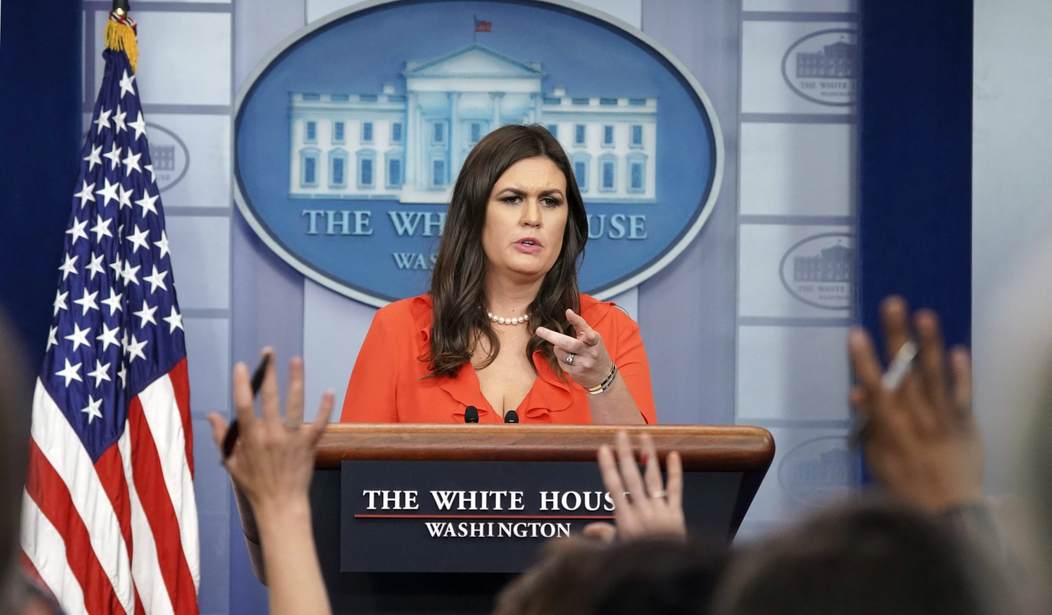WASHINGTON – White House press secretary Sarah Huckabee Sanders said White House correspondents should “move away” from “anonymous sourcing,” a practice that is also used by the administration, because it is doing a “big disservice” to the American people.
“We had a meeting in our office today to push for things that come from the administration and particularly from the press office to be on the recofrd because I think it’s hard for us to argue that we want you guys to have on record sources if we’re not going on the record,” Sanders said during a discussion on “Trump’s First Year: Will Politics, Policy and the Presidency Ever be the Same?” at George Washington University on Monday.
“Now there are going to be times that it’s going to be process stuff that isn’t necessarily on the record, but if it’s particularly a policy initiative and things like that, that should be on the record from us,” she said.
The administration frequently gives “background” briefings, not allowing reporters to refer by name in their stories to the officials speaking with the press corps.
Sanders explained that the White House has tried with “some success” to do more on-the-record and on-camera briefings over the past few months to demonstrate a “sense of access and sense of transparency.” She said that the White House plans to hold on-the-record policy briefings more often.
“But it goes both ways and I don’t think we can be asked to constantly be out in the open and be transparent and to do something so forward-leaning and always on the record when we’re constantly having to compete with anonymous sources that weren’t in the room, that aren’t part of the process and can, frankly, make up anything in the world they want to because we can’t prove a negative,” she said.
“If we have to compete with that constantly I think that is a really difficult situation, and I think it’s a very big disservice to the American people that there isn’t more credible sourcing. I think in the bigger outlets it’s less of a problem, but now anybody with a computer can be a journalist and you’re constantly having to juggle the differences of real journalism,” she added. “But I do think that anonymous sourcing is a really big problem and something that as much as we can move away from, we should.”
Sanders said the media’s questioning of the White House frequently carries an accusatory tone.
“Oftentimes, I think that it is not even the nature of the question, it is the way that a question is asked. So often, I feel like certainly the question always comes from a place like an accusation, instead of asking like you’re looking for information. It is more like, ‘you are a horrible person, tell us why.’ They actually think I am a horrible person,” she said, garnering some applause from the audience. “I don’t know if that’s why they were clapping. I don’t know – either way.”
In response, Frank Sesno, director of the School of Media and Public Affairs at George Washington University, said the White House has always been a “political place” compared to federal agencies such as the State Department. Sanders told Sesno that the accusatory questioning does not happen all the time.
“I think there’s a difference between a political tone and a hateful tone…I am not trying to generalize the entire press corps. Absolutely, I can assure you. I mean, you look at reporters, not just some of their public statements through their stories, but you look at some of their Twitter statements,” Sanders said.
“You look at some of their feeds and you cannot read through a lot of that and say this person absolutely hates everything about what we are doing,” she added. “And it is hard to come to any other conclusion than that when you look at so many of the personal opinions injected into a lot of those, and I think that is a dangerous place at times.”
Glenn Thrush, White House correspondent at the New York Times, said President Trump’s ability to “raise the negative” aspects of his opponents in the 2016 presidential campaign was “totally smart” and “genius” given that he won the election.
“It is very important to note that President Trump has made battling the press a centerpiece of his entire political career. He did it during the campaign trail by singling out individual reporters in the press pen; it is a centerpiece of his entire political strategy,” Thrush said during the discussion. “I would disagree profoundly with Sarah on this. Nobody hates anyone. Actually, I cannot speak for everybody. I can only speak from my mellow self.”
Thrush said Trump needs opponents the absence of Hillary Clinton since he “performs best” with opposition. He referred to the political press as Trump’s perceived main opponent.
“He needs an opponent. This is a politician who does not do particularly well standing alone on center stage. He is somebody who performs best as a politician and as a political entity with opposition,” he said. “He chooses opponents. Mitch McConnell at the moment is a target. He requires that because that is what his political career is premised on and the political press is his central omnipresent opponent more than anyone else, I think.”









Join the conversation as a VIP Member